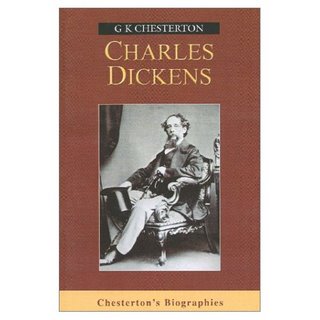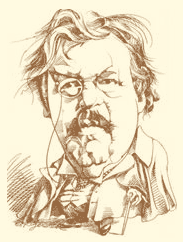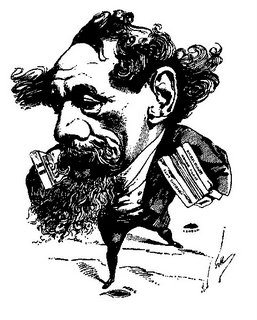 “Whatever the word ‘great’ means, Dickens was what it means.”
“Whatever the word ‘great’ means, Dickens was what it means.”G.K. Chesterton made this observation of the profoundly gifted English storyteller/novelist in his esteemed work of literary criticism, Charles Dickens, published in 1906.
The book was one of Chesterton’s earliest but in many ways, one of his most important. For not only was this work an intensely personal one, reflecting his deep respect and affection for Dickens but it was a work that effectively launched a new appreciation of Dickens among English readers. Furthermore, it was a work that would also launch an appreciation among English readers of a new and very present literary giant, Gilbert Keith Chesterton himself.
It is not all that far-fetched to surmise that without Chesterton’s Charles Dickens, we might not see the modern popularity of either.
Therefore, this provocative little book (it's less than 150 pages) serves, even now, as a splendid introduction to both writers. It has been for decades extremely popular among Dickensians as the "primary primer" written about their man while Chestertonians value it as an insightful tribute to the writer that GKC most loved, was most influenced by, and whose work most resembled his own.

Of course it should be emphasized that this work is anything but an immoderate plaudit to Dickens; indeed, GKC is sharply critical of several points in Dickens’ style, plot and character consistency. However, these criticisms (most of which, by the way, I reject) are still written as a friend. They never stoop to the levels of arrogance one is used to in reading literary criticism.
For instance, Chesterton suggests that Dickens’ characters sometimes go beyond the author’s control, but then he explains that this is only because of Dickens’ invigorating “carnival of liberty” and “democratic optimism” -- the very reasons why readers so love the characters anyway! One definitely gets the feeling that even when he disagrees with Dickens, Chesterton is winking and raising a glass.
One of the most important goals of quality literary criticism is that it accurately describes the author’s key strengths. Chesterton does that very well. But he succeeds in the even more laudable goal of literary criticism in that even before you’re finished reading the criticism, you’ve become very eager to go read the original work that inspired it.
From the discussion we experienced last week when the Omaha Chesterton Society took up GKC’s Charles Dickens, that point was proven well. Those of us who find in Dickens a favorite were already planning on what novels we wanted to dive into again, while those of us less familiar with the creator of Scrooge, Mr. Micawber, the Pickwick Club, the severe case of Jarndyce v. Jarndyce and so on, were quite enthusiastic about making their initial acquaintance. That is a good recommendation in itself for Chesterton's truly foundational work, Charles Dickens.
Now keep in mind that, as in all of Chesterton’s biographical studies, the reader learns as much about Chesterton as he does whoever the fellow is that he's supposed to be writing about! But, given the effervescence of Chesterton, that’s a joy. However, this work on Dickens (others were to follow from Chesterton’s pen too) contains many unique and penetrating insights into the life and work of Dickens. Let me cite just a a few of my quotable favorites:
“If [Dickens] learnt to whitewash the universe, it was in a blacking factory that he learnt it.”

“Into whatever cranny of our city his characters might crawl, Dickens had been there before them.”
“A man reading the Dickens novel wished that it might never end.”
“All his characters are, so to speak, designed to be old friends; in a sense, every Dickens character is an old friend, even when he first appears.”
“Dickens had common sense and uncommon sensibility.”
I’d list a few more but I’ve got to close this review of G.K. Chesterton’s Charles Dickens and get on to what it inspired me to do; namely, start re-reading Great Expectations or Bleak House...or maybe I'll indulge in Oliver Twist or perhaps...